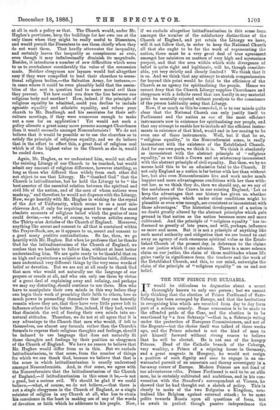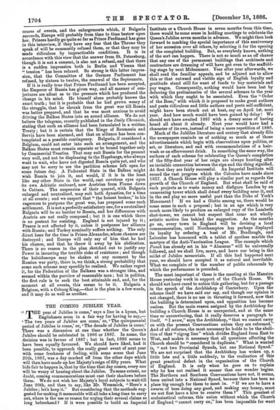THE NEW PRINCE FOR BULGARIA.
IT would be ridiculous to dogmatise about a secret thoroughly known to only one person ; but we cannot help thinking that the election of Prince Ferdinand of Saxe- Coburg has been arranged by Europe, and that the hesitations in recognising him which are recorded from day to day form part of a solemn comedy. Some concession is to be made to the offended pride of the Czar, and the election is to be sanctioned by "a free Sobranje "—that is, a Sobranje voting. under the protection of European Commissioners, and not of the Regents—but the choice itself was talked of three weeks ago, and the Prince selected is not the kind of man to put himself forward without strong reason to believe that he will be elected. He is not one of the hungry Princes. Head of the Catholic branch of the Coburgs, very wealthy, a Prince of a reigning house in Germany, and a great magnate in Hungary, he would not resign. a position of such dignity and ease to engage in an un- warranted pursuit of an uncertain and thorny sovereignty in a far-away corner of Europe. Modern Princes are not fond of too adventurous rliles. Prince Ferdinand is said to be an able man, he is certainly cultivated and ambitious, and in his con- versation with the Standard's correspondent at Vienna, he showed that he had thought out a sketch of policy. This is clearly to make of the two Bulgarias a Kingdom, neu- tralised like Belgium against external attack ; to be racist polite towards Russia upon all questions of form, bnt to await in perfect though passive independence the
course of events, and the enlargements which, if Bulgaria succeeds, Europe will probably from time to time bestow upon her. Princes hardly go quite so far as Prince Ferdinand has gone in this interview, if they have any fear that the Throne they speak of will be summarily refused them, or that they may be
made ridiculous by impracticable conditions. It is in accordance with this view that the answer from St. Petersburg, though it is not a consent, is also not a refusal, and that there is a sudden impression both in Berlin and Vienna that " tension " has been relaxed. So strong is this latter impres- sion, that the Committee of the German Parliament has refused, by sixteen to twelve, the renewal of the Septennate. If it is really true that Prince Ferdinand has been accepted, the Emperor of Russia has given way, and all manner of con- jectures are afloat as to the pressure which has produced the change in his mind. He himself alone probably knows the exact truth ; but it is probable that he had grown weary of the struggle, that he shrunk from the great war till Russia was better prepared, and that he was most anxious to avoid driving the Balkan States into an armed alliance. We do not believe the telegram, recently published in the Daily Chronicle, stating that such an alliance had been formulated in a written Treaty ; but it is certain that the Kings of Roumania and Servia have been alarmed, and that an alliance has been con- templated as a possible contingency. Bulgaria, if considered a Belgium, could not enter into such an arrangement, and the Balkan States must remain separate or be bound together only by Commercial Treaties. That may suit Russia for the present very well, and not be displeasing to the Hapsburgs, who always want to wait, who have not digested Bosnia quite yet, and who may not be sorry to see the partition scheme left open for some future day. A Federated State in the Balkan might wish Bosnia to join it, and would, if it is in the least like any other State in the world, cast covetous eyes upon its own Adriatic seaboard, now Austrian from Fiume down to Cattaro. The suspension of their quarrel, with Bulgaria
enlarged and neutralised, may suit both dynasties, for a time at all events ; and we suspect that "the honest broker," in his eagerness to postpone the great war, has proposed some such settlement. It is not a perfectly satisfactory one, for a neutralised Bulgaria will be no barrier to Russia, and her differences with Austria are not really composed ; but it is one which there is no pretext for resisting. England is not injured by it ; France is not affected by it, unless it postpones her alliance with Russia; and Turkey nominally suffers nothing. The only direct loser for the time is Prince Alexander, whose chances are destroyed ; and Europe will only say of him that he had his chance, and that he threw it away by his abdication.
There is no reason in the plan sketched out to justify any Power in incurring the terrible risks of resistance ; and though the kaleidoscope may be shaken at any moment by the Russian war party, there is, we think, a strong probability that some such scheme may speedily be realised. We rather regret it, for the Federation of the Balkans was a stronger idea, and seemed within the purview of reasonable men ; but in politics, the first rule is to seek the best attainable end, and, for the moment at all events, this seems to be it. Bulgaria a Belgium, with a Coburg King,—that is the plan in a few words, and it may do as well as another.











































 Previous page
Previous page